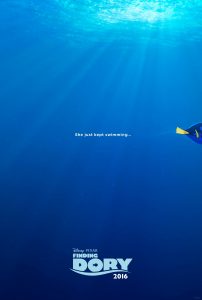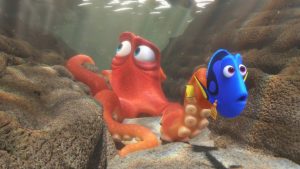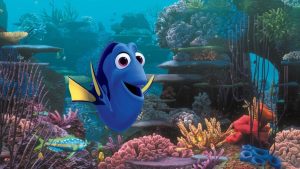Dory’s Upbeat Optimism
 “Dory’s optimism and helpful nature are a defense,” says Stanton. “It is an unconscious armor she presents in hopes others won’t tire of her challenge and ditch her.
“Dory’s optimism and helpful nature are a defense,” says Stanton. “It is an unconscious armor she presents in hopes others won’t tire of her challenge and ditch her.When we first meet her in ‘Finding Nemo,’ one of the very first things she says is ‘I’m sorry.’ She just assumes that somehow her short-term memory loss has caused a problem and she’s quick to try to mend it. That, for me, is really juicy stuff. That’s somebody that deserves to feel better about themselves; that’s a main character with a story to tell.”
“It’s a story about family,” says Ellen DeGeneres, who lends her voice to Dory. “It’s about finding the courage to do something she’s always wanted to do—even if she couldn’t remember she wanted to do it.”
According to Stanton, the story crew initially showcased Dory as lighthearted, bubbly and funny—attributes that certainly apply to the character, but left her lacking depth. “She seemed a little two-dimensional,” says the director. “I realized that even though I had her full backstory in my head, nobody else did—including the audience. Everyone walked away from ‘Nemo’ with fond memories of how funny she is. But I always saw that as a mask. I realized we’d have to fill in the audience about what happened to her when she was young.”
Finding Dory reveals that Dory has a loving mom and dad who dote on their daughter, patiently helping her manage her short-term memory loss.
 “They don’t try to change her,” says Stanton. “They just want to help her own who she is. Being a parent and seeing my kids grow up and enter the world, I realize that kids are all born with certain temperaments, flaws, quirks—and it’ll always be who they are. You probably spend most of your time as a parent worrying about those things, too—you don’t lose sleep over the things they do well. The best quality I could give Dory’s parents is that they never doubt her.”
“They don’t try to change her,” says Stanton. “They just want to help her own who she is. Being a parent and seeing my kids grow up and enter the world, I realize that kids are all born with certain temperaments, flaws, quirks—and it’ll always be who they are. You probably spend most of your time as a parent worrying about those things, too—you don’t lose sleep over the things they do well. The best quality I could give Dory’s parents is that they never doubt her.”Despite their best efforts, young Dory gets lost. “She wanders the ocean for most of her life,” says Stanton. “And slowly forgets why.”
A massive stingray migration cruises through their neighborhood, triggering Dory’s memory. “The experience is viscerally similar to an event that separated her from her parents so long ago,” says Stanton. “She’s flooded with memories and suddenly very motivated to track down her family.”
 In an effort to maintain Dory’s drive to find her family, filmmakers had to first understand her memory issues. Says producer Lindsey Collins, “While Dory forgets details in her day-to-day life—like Nemo’s name—her emotional memory is fine—she knows she loves Nemo and Marlin. And the love she has for her parents has been with her all along.”
In an effort to maintain Dory’s drive to find her family, filmmakers had to first understand her memory issues. Says producer Lindsey Collins, “While Dory forgets details in her day-to-day life—like Nemo’s name—her emotional memory is fine—she knows she loves Nemo and Marlin. And the love she has for her parents has been with her all along.”“The mystery of memory is so important to the story,” adds screenwriter Victoria Strouse. “Memory is a huge part of family—all of those seemingly meaningless or mundane interactions we all experience as children stay with us and shape our personalities. Dory possesses those memories—on some deep level—and accessing them is part of her ultimate journey of realizing that she’s not broken after all.”
According to co-director Angus MacLane, the memory flash marks the beginning of a new adventure. “It kicks off a quest—both internally and externally—to try to find her family,” he says. “But Dory feels that she can’t do it on her own, so she talks her newfound family—Marlin and Nemo—into coming along.”
Dory finds her way to the “Jewel of Morro Bay”—the Marine Life Institute (MLI), where she believes her family may be. The MLI is a rescue and rehabilitation center and premiere aquarium.
In the journey to the MLI, Dory finds herself separated from Marlin and Nemo, and must rely on her own intuition—as well as a host of colorful characters, appealing to each of them to help her on her quest. “I play a disgruntled octopus named Hank,” says Ed O’Neill, who was tapped by filmmakers to bring Dory’s chief wingman to life. “He doesn’t like anybody and just wants to be left alone.”
“We realized that Dory needed a foil,” says Stanton. “Dory was created in the first movie as a surrogate for Nemo. Marlin’s emotional journey to be a better parent called for a character like Dory to test him. Kids—and Dory—are very in the moment; they don’t think about the future too much. They take risks and have fun.
 “For this film,” Stanton continues, “we needed a surrogate Marlin. Hank is a curmudgeon, an introvert. He really doesn’t want to be healed and sent back out to the ocean. He’d prefer a solitary existence inside an aquarium tank, so he’s trying to get himself into a more permanent installation.”
“For this film,” Stanton continues, “we needed a surrogate Marlin. Hank is a curmudgeon, an introvert. He really doesn’t want to be healed and sent back out to the ocean. He’d prefer a solitary existence inside an aquarium tank, so he’s trying to get himself into a more permanent installation.”“Hank is smart, set in his ways and very cranky,” says DeGeneres. “He’s not happy where he is, while Dory is always happy wherever she is. There’s a great juxtaposition between these two; they’re complete opposites. It’s a great pairing because she is so innocent, yet pushes him to open his mind. They’re both fearful—though Dory doesn’t realize it. She just keeps swimming.”
Dory, Marlin and Nemo embark on a new adventure—this time to the California coastline—on an uncertain search for the family Dory thinks she left behind. Their journey leads them to the Marine Life Institute, where they meet a diverse array of sea creatures. “It really is a whole new chapter this time,” says director Andrew Stanton.

(Pictured) DORY. ©2013 Disney•Pixar. All Rights Reserved.
DORY is a bright blue tang with a sunny personality. She suffers from short-term memory loss, which normally doesn’t upset her upbeat attitude—until she realizes she’s forgotten something big: her family. Of course, she’s found a new family in Marlin and Nemo, but she’s haunted by the belief that someone out there is looking for her.
Ellen DeGeneres was called on to provide her iconic voice to the lauded character for Dory’s return to the big screen—something DeGeneres often imagined on “The Ellen DeGeneres Show.” “I was campaigning for a sequel to ‘Finding Nemo’ for 13 years,” says the comedian and talk show host, “but I never imagined it would be ‘Finding Dory.’ So that was the real surprise when I finally got the call.”
DeGeneres’ multiple-Emmy®-winning talk show launched just a few months after “Finding Nemo” opened in theaters, catapulting the comedian to new heights. So when it came time to revisit the character, filmmakers realized a lot had changed since she first gave voice to Dory. But according to Stanton, their reunion was just like old times—in more ways than one. “I saw Ellen on the same recording stage at Disney Studios with the same engineer and the same crew as the last day we had worked in 2003. She walked in and we picked up exactly where we had left off.”
The new story features a deeper side of the ever-optimistic fish, challenging DeGeneres to showcase a wide range of emotion. “Doing an animated film is really fun,” she says. “But it can be difficult because every emotion has to come from your voice. You can’t pretend to cry, because that just sounds like you’re pretending to cry. So it’s all real—real conversations, real emotion.”
“To me, Dory was always a tragic character,” says Stanton. “Short-term memory loss just can’t be fun. No matter how much she puts her brave face on and makes the best of an extremely difficult condition, it has to be frustrating and frightening. She has no idea where—who—she comes from.”
Adds screenwriter Victoria Strouse, “I think her cheery personality is her way of compensating for her shortcomings. Her helpfulness works to induce others to stay with her, to ensure she’s never alone. She has a deep fear of being abandoned, and an even deeper fear about her own short-term memory loss and how it might alienate others and cause them to leave her.”
Dory may have trouble recalling exactly what—or who—she’s searching for, but she won’t give up until she uncovers her past and discovers something else along the way: self-acceptance. “In the beginning, she is painfully aware that she requires Marlin and Nemo’s help,” says co-director Angus MacLane. Over the course of the film, she learns to listen to her gut again, accept who she is and her unique way of thinking and living—and that becomes the key to her success.”
“I think people love Dory because there’s not one speck of judgment in her,” adds DeGeneres. “She’s never mean. No matter what she’s faced with, she just carries on. She does what needs to be done.”
Story supervisor Max Brace says part of Dory’s charm stems from her memory loss. “She lives in the moment,” says Brace. “She doesn’t have a choice, really. As a result, she doesn’t over-think things. She’s present and flexible to handle whatever curve balls life has in store for her.”




Speak Your Mind